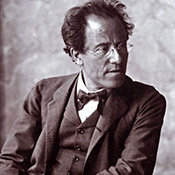
D’un Soir Triste: JoAnn Falletta & Lili Boulanger
David Lewellen
PUBLISHED
Tagged Under: 2018.19 Season, Classics, Conductor
The first piece on the MSO’s program this week might still be languishing in obscurity, if not for the work of a conductor with strong Milwaukee ties.
When JoAnn Falletta was beginning her career as the Milwaukee Symphony’s associate conductor in the 1980s, she also led the Women’s Philharmonic in San Francisco – an orchestra dedicated exclusively to performing the works of women composers across the centuries. It was exciting, groundbreaking work, and among the many pieces that it brought to light was the final work of a young French composer a century ago.
“D’un Soir Triste,” or “Of a Sad Evening,” was written by Lili Boulanger in 1918, shortly before her death at age 24. Her sister, the famous composition teacher Nadia Boulanger, put the piece away until shortly before her death in 1979.
“The handwriting was almost illegible,” said Falletta, now the music director of the Buffalo Philharmonic and the Virginia Symphony, and a semi-regular guest conductor in Milwaukee. “She was so sick, and her penmanship was really weak. It was her goodbye to the world. She knew she was going to have a short life.”
Working from photocopies of Lili Boulanger’s original parts, Falletta and the musicians “struggled to figure out what the notes were,” she said. “We never felt we were completely sure.” But “it was a labor of love for the orchestra to do it,” she said, and only in the specialized environment of the Women’s Philharmonic could it have happened; a full-time orchestra would never devote the necessary rehearsal time to piece it together.
The Women’s Philharmonic disbanded in 2003, but Falletta said it did important work in giving audiences the opportunity to hear women as serious composers — and conductors, too. Karina Canellakis, this weekend’s MSO guest conductor, is part of a new generation. “Even in the last five years, the image of the conductor as an older European man is changing,” Falletta said. But although Canellakis suggested adding the Boulanger to this week’s program, getting women composers onto a typical orchestra’s schedule is still a work in progress. Without the motivation to seek it out, Falletta said, conductors “don’t know how to find it, or what’s good, or where the parts are.”
Falletta speaks enthusiastically about Lili Boulanger’s role as a groundbreaking composer. “D’un Soir Triste” contains “lots of parallel open fifths, dark colors,” she said. “For 24 years old, she was so advanced harmonically. It was very French, pushing the envelope, but not in the way Debussy did. Debussy was floating away from harmony altogether, but she was building a very dense harmonic structure.”
The piece was composed as a companion to “D’un Matin de Printemps,” or “Of a Spring Morning.” But for Milwaukee audiences who will hear only half of the diptych, Falletta said, “You can take it for what it is. It’s very beautiful on its own. It draws the audience into a quiet world.”
Nadia Boulanger gave up composition herself after her sister’s death to concentrate on teaching, influencing generations of composers as diverse as Aaron Copland and Elliot Carter. “We probably wouldn’t know Lili without Nadia today,” Falletta said. “She was constantly talking about her sister. . . . It’s a great tragedy, what she would have written if she had been healthy and lived.”
Reconstructing “D’un Soir Triste,” was made harder by Boulanger’s harmonic idiom; the dense, modal language means that it’s often not obvious what the composer intended. But after the Women’s Philharmonic performance in 1986 (as far as Falletta knows, it was the American professional premiere), the score, with the musicians’ corrections and best guesses, was published. Even now, Falletta says, the definitive version is still awaited – “And it could be that this week, Karina will find things that she’s not sure of. It happens every time.”



